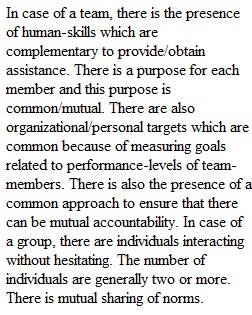


Q • Explain the difference between a group and a team in an organizational setting. What are the core differences and what are the similarities? What are the advantages and disadvantages of each? Provide some examples. Then, reflect on a current or previous job where you worked on a team or in a group and respond to the following prompts: 1. Define the type of team or group. 2. Explain the history of the team. How and why was the team created? 3. Explain your role in the team or group. 4. Illustrate the team environment. 5. Describe how individual behaviors impacted the team's effectiveness. 6. Explain how did the team's overarching behavior influenced the organization. In response to your classmates' posts, using the examples of teamwork and group work that they have provided, ask questions designed to explore ways to improve the team environment or encourage a more positive influence by teams on the organization. As you respond to the initial questions and to your classmates' posts, consider the concepts we have explored throughout the course, including, but not limited to, employee empowerment, leadership versus management, conflict and organizational politics, employee attitudes, organizational culture, communication, and employee motivation. How do these concepts support groups and teambuilding? Support your initial post and response posts with scholarly sources cited in APA style. To complete this assignment, review the Discussion Rubric document. You have new Updates
View Related Questions